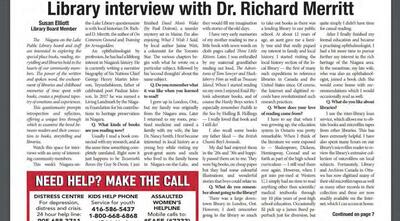Library interview with Dr. Richard Merritt The Niagara-on-the-Lake Public Library board and staff are interested in exploring the special place books, reading, storytelling and libraries hold in the hearts of our community members. The power of the written and spoken word, the enchantment of libraries and childhood memories of time spent with books, creates a profound tapestry of emotions and experiences. This questionnaire prompts introspection and reflection, offering a unique lens through which to examine the bond between readers and their connection to books, storytelling and libraries. Watch this space for interviews with an array of interesting community members. This week’s Niagara-onthe-Lake Library questionnaire is with local historian Dr. Richard D. Merritt, the author of On Common Ground and Training for Armageddon. An ophthalmologist by profession, he has had a lifelong interest in Niagara’s history. He is currently writing a narrative biography of Six Nations Chief George Henry Martin Johnson, Teyonhehkwen, father of celebrated poet Pauline Johnson. In 2017 he was named a Living Landmark by the Niagara Foundation for his contributions to heritage preservation in Niagara. Q. What kinds of books are you reading now? Usually I read a book connected with my research, and at the same time something completely unrelated. Right now it just happens to be Tecumseh’s Bones (by Guy St-Denis. I just finished Dead Man’s Wake (by Paul Doiron), a murder mystery set in Maine. I’m also enjoying What I Wish I Said, by local author Jaime Watt, a columnist for the Toronto Star. The various chapters begin with what he wrote on a particular subject, followed by his ‘second thoughts’ about the same subject. Q. Do you remember what it was like when you learned to read? I grew up in London, Ont., but my family was originally from the Niagara area. Later I returned to my roots, practised medicine and raised a family with my wife, the late Dr. Nancy Smith. I first became interested in local history as a young boy while visiting my great-great aunts and uncle who lived in the family home in Niagara-on-the-Lake, and they would fill my imagination with stories of the old days. I have very early memories of my mother reading to me a little book with sewn words on cloth pages called Three Little Kittens. Later, I was enthralled by my maternal grandfather reading out loud, The Adventures of Tom Sawyer and Huckleberry Finn as well as Treasure Island. When I started reading on my own I enjoyed Enid Blyton’s adventure books, and of course the Hardy Boys series. I especially remember Paddle to the Sea by Holling B. Hollings — I really loved that book and I still do! I also recall some books my father liked — the British Chum’s Boy’s Annuals. My dad had enjoyed them in the ’20s and ’30s and happily passed them on to me. They were big books, on cheap paper but they had some colourful illustrations and wonderful stories that boys could relate to. Q. What do you remember about going to the library? There was a large downtown library in London, Ont. However, I don’t remember going to the library so much to take out books as there was a lending library in our public school. At about 12 years of age, an aunt gave me a family tree and that really piqued my interest in family and local history. I started visiting the local history section of the local library — the first of many such expeditions to reference libraries in Canada and the United States since. Of course, the Internet and digitized records have revolutionized such research practices. Q. Where does your love of reading come from? I have to say that when I was growing up, the education system in Ontario was pretty remarkable. When I think of the literature we were exposed to — Shakespeare, Dickens, Hemingway, Conrad and so forth as part of the high school curriculum — I still read them over again. However, when I got into pre-med at Western U, I simply had no time to read anything other than scientific/ medical textbooks through my 10 plus years of post-high school education. Occasionally I’d pick up a James Bond paperback just for diversion, but quite simply I didn’t have time for casual reading. After I finally finished my formal education and became a practising ophthalmologist, I had a bit more time to pursue further my interest in the rich heritage of the Niagara area. In the meantime, my late wife, who was also an ophthalmologist, joined a book club. She would come home with recommendations which I would occasionally read as well. Q. What do you like about libraries? I use the inter-library loan service, which allows me to obtain books and microfilm tapes from other libraries. This has been extremely helpful. I have also spent many hours on our library’s microfilm reader to review the library’s extensive collection of microfilms on local subjects. Fortunately, Library and Archives Canada in Ottawa has now digitized many of their old microfilm tapes as well as many other records in their collection and these are now readily available on the Internet, which I can access at home. Susan Elliott Library Board Member Continued on page 7
I’m currently writing a biography of George Henry Martin Johnson, Teyonhehkwen, a legendary Chief of Six Nations in the 19th century. Many of the records on Indigenous subjects in Canada have been digitized recently, in part because of the Truth and Reconciliation Commission’s work, and this has been invaluable! I have now gone through tens of thousands of such documents online, which would have been impossible without Canada’s central library and archives. Q. How did reading as a young person influence you as a doctor and a historian? They’re two different solitudes: science and history, although they do come together in another interest of mine: the history of medicine. As a medical student one learns to take a patient’s history and, after the physical examination, one interprets any lab and radiological findings. In challenging cases, the physician may even consult reference sources. Interpreting and writing history in many respects is a similar process. But I’m convinced that being exposed to different writing styles and genres invariably improves one’s own writing style. I’ve read a lot of history and non-fiction adventure/expedition books over the years — Ernest Shackleton’s South: The Endurance Expedition, 1914-1916 comes to mind; more recently I’ve been influenced by Canadian historian Charlotte Gray, whose many works include biographies of Pauline Johnson and Alexander Graham Bell, who was a good friend of ‘my’ Chief Johnson. Pierre Berton’s output was truly remarkable — I once met him at a book launch and he freely admitted that he had three or four researchers — I wish I had those resources. Q. What is the value of a library? As I explained, the library has been invaluable for me personally; however, I was so impressed whenever I came into the library to use the microfilm reader, just how busy the library was: I would witness children of all ages coming either with their school class or on their own, excitedly picking out books to take home; sometimes there was a librarian simply reading to a small group of children, while on other occasions a parent (or grandparent) would be sitting there quietly reading a story to his/her own child. And whenever I’m at the front desk I’m impressed by all the coming and going of folks of all ages. I also know of at least one person who comes in regularly to the library just to use the computer. I’m familiar with others who enjoy the periodicals. No doubt, for some the library provides a refuge — a pleasant, ‘safe’ place to escape from their little apartment or perhaps some social conflict. Q. Do you have a favourite book that you keep coming back to read again and again? I’m sure for many, one’s favourite book changes from decade to decade or genre to genre or simply evolves according to one’s stage in life. There are books that on reading the last sentence, you sigh and think ‘wow, that was the best read yet.’ Then you find other books perhaps equally impressive and you conclude that someday you will just have to go back and relive that special read. One that sticks with me is The Englishman’s Boy by Guy Vanderhaeghe — I’ll be coming back to it, someday. Also, All the Light We Cannot See by Anthony Doerr was wonderful, in part from my own perspective as an ophthalmologist. I really enjoyed Canadian author Alistair MacLeod’s novel, No Great Mischief, although I was frankly disappointed to learn how little regard General Wolfe had for my Scottishsoldier ancestors. One would be remiss if I didn’t mention The Journal of Major John Norton 1816 with its remarkable narrative of Indigenous Peoples and the War of 1812, including many references to Niagara. I was fortunate to hold Norton’s original manuscript in my hands in the library of Alnwick Castle, England, where it sat forgotten for 150 years until discovered by a researcher and published (and later reprinted) by the Champlain Society. Q. Has the library supported your work as an author? Yes — they held an evening event where I could talk and answer questions about my recent publication — such an important resource to have an institution like a local library that supports local writers.




